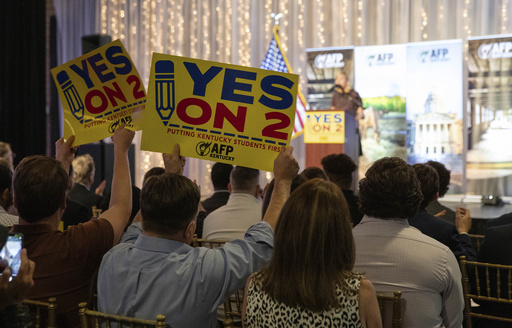
WASHINGTON — The election of Donald Trump has brought forth a renewed ally for school choice, as he re-enters the White House along with a Republican-led Senate—and possibly a Republican-led House—that may be more open to proposals that struggled to gain traction during his previous term.
Despite previous setbacks in various states regarding the expansion of private schooling, Trump’s election has uplifted the spirits of federal school choice advocates. One of their key goals moving forward is to implement tax credits for donations to organizations that offer private school scholarships.
Jim Blew, who was an assistant secretary in the U.S. Education Department during Trump’s first administration, expressed optimism that the new Congress will approve initiatives like tax credits for educational scholarships. “The new members are all very clearly supportive of school choice, and I think that’s going to change the dynamics,” said Blew, who co-founded the conservative Defense of Freedom Institute.
Private school choice encompasses several mechanisms allowing taxpayer funding to support educational options beyond traditional public schools. These include vouchers, education savings accounts, and tax-credit scholarships. Universal private school choice, which aims to make these options available to all families regardless of their financial situation, has seen a surge in acceptance and is now established in law across a number of states. Nearly thirty states offer some form of private school choice.
However, this concept faces opposition—not just from teachers’ unions, which favor keeping public funds in public schools, but also from some conservatives in rural states, where private schools may be scarce. In these areas, public school districts often represent the largest employment sector.
In the recent elections, voters in Kentucky rejected a measure to fund private school attendance through public means, while Nebraska voted to partially repeal the law that uses taxpayer funds to support private education. A proposed amendment in Colorado to establish a “right to school choice” for children was also voted down.
The concerns surrounding the diversion of funds from public education resonated even in staunchly Republican locations such as Kentucky and Nebraska. Ferial Pearson, chair of a public education advocacy group in Nebraska, noted efforts would continue to bolster public schools with necessary resources.
Democratic Governor Andy Beshear of Kentucky remarked that the voters clearly indicated a preference for prioritizing taxpayer funds to public schools, declaring that this should conclude all discussions regarding the transfer of public resources to unaccountable private institutions. He reiterated the need for increased salaries for public school personnel and outlined plans for universal pre-K programs across the state.
Some observers were not surprised that even in Trump-leaning states, there was resistance to school choice. “The pandemic, marked by school closures, learning loss, and chronic absenteeism, has led parents to desire changes while still valuing their public schools,” noted Liz Cohen, policy director at FutureEd, a nonpartisan research institute at Georgetown University. Cohen explained that local ballot decisions often feel more consequential than national election votes.
During his campaign, Trump championed school choice as a means of enhancing parental rights, pushing back against what he and other conservatives describe as leftist indoctrination in educational settings, while promoting a free-market perspective on education.
Trump has vowed to advocate for homeschooling families and to safeguard every parent’s right to guide their children’s education. He aims to allow these families to utilize 529 college savings plans for educational expenses, a plan he initially proposed for private school families during his first term.
During his previous term, Trump appointed Betsy DeVos, a staunch proponent of school choice, as his education secretary. However, his administration faced difficulties in advancing school choice initiatives, with the attempt to introduce federal tax credits for scholarship donations failing, alongside plans to significantly cut federal funding for public school programs.
With a more favorable Congress, there may be better opportunities for these ideas to gain momentum. Senator Bill Cassidy from Louisiana, likely to chair the Senate Committee on Health, Education, Labor and Pensions, has expressed his support for tax incentives for scholarship donations. Additionally, Republican House Speaker Mike Johnson has voiced his commitment to enhancing school choice for parents while holding university administrations accountable for their decisions.
Some conservatives argue that leaving the school choice issue in the hands of the states may prove beneficial. Michael Petrilli, president of the Fordham Institute, a conservative think tank, voiced concern over potentially revisiting the political environment of Trump’s first term, which negatively impacted the charter school sector in blue states. He cautioned that Trump’s strong support for school choice had made these issues contentious, sidelining reform-minded Democrats.
In other developments across the country, preliminary reports indicated victories for school board candidates in Los Angeles and Chicago who emphasized traditional public education over alternatives like charter schools. In Texas, various pro-voucher legislators endorsed by Governor Greg Abbott were successful in their races, potentially paving the way for the passage of voucher legislation in the state as Abbott targets those who opposed previous funding plans.
